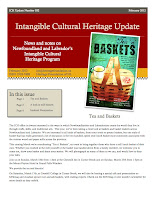Friday, March 16th, 2012
Glynmill Inn, Corner Brook
This introductory workshop is open to anyone with an interest in local history, culture and folklore. It is intended to give a background on how to conduct research interviews in the field, and will give people a chance to try their hand at creating interview questions and conducting an interview. It will provide an overview of the methodology and explore the practical matters of creating, designing, and executing effective oral history research projects. Topics that the workshop will address include project planning, ethical issues, and recording equipment.
The workshop will be taught by folklorist Dale Jarvis. Dale Jarvis works as the Intangible Cultural Heritage Development Officer for the province of Newfoundland and Labrador, helping communities to safeguard traditional culture. He has been working for the Heritage Foundation of Newfoundland and Labrador since 1996, and holds a BSc in Anthropology/Archaeology from Trent University, and a MA in Folklore from Memorial University. He is a past president of the Newfoundland Historic Trust, and has contributed as a board member and volunteer to many local arts and heritage organizations, and is a tireless promoter of the oral tradition.
Date: Friday, March 16th
Time: 1pm - 5pm
Workshop fee: $40 (preregistration required)
Location: Glynmill Inn, Corner Brook
To register call Nicole at 1-888-739-1892 ext 3, or email: ichprograms@gmail.com
Glynmill Inn, Corner Brook
This introductory workshop is open to anyone with an interest in local history, culture and folklore. It is intended to give a background on how to conduct research interviews in the field, and will give people a chance to try their hand at creating interview questions and conducting an interview. It will provide an overview of the methodology and explore the practical matters of creating, designing, and executing effective oral history research projects. Topics that the workshop will address include project planning, ethical issues, and recording equipment.
The workshop will be taught by folklorist Dale Jarvis. Dale Jarvis works as the Intangible Cultural Heritage Development Officer for the province of Newfoundland and Labrador, helping communities to safeguard traditional culture. He has been working for the Heritage Foundation of Newfoundland and Labrador since 1996, and holds a BSc in Anthropology/Archaeology from Trent University, and a MA in Folklore from Memorial University. He is a past president of the Newfoundland Historic Trust, and has contributed as a board member and volunteer to many local arts and heritage organizations, and is a tireless promoter of the oral tradition.
Date: Friday, March 16th
Time: 1pm - 5pm
Workshop fee: $40 (preregistration required)
Location: Glynmill Inn, Corner Brook
To register call Nicole at 1-888-739-1892 ext 3, or email: ichprograms@gmail.com






